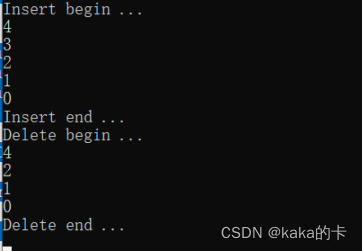目录
1. 老生常谈的两个宏(Linux)
offset
测试demo
container_of
({})
Typeof
推算结构体起始地址
测试demo
2. Linux内核链表剖析
移植linux内核链表,使其适用于非GNU编译器
Linux内核链表的位置和依赖
移植时的注意事项
移植好的LinuxList.h
分析linux内核中链表的基本实现
linux内核链表的实现
linux内核链表的结点定义
测试demo
C/C++Linux服务器开发/后台架构师【零声教育】-学习视频教程-腾讯课堂
1. 老生常谈的两个宏(Linux)
offset
//offsetof用于计算TYPE结构体中MEMBER成员的偏移位置#ifndef offsetof#define offsetof(TYPE, MEMBER) ((size_t)&((TYPE*)0)->MEMBER)#endif测试demo
#include <stdio.h>#ifndef offsetof#define offsetof(TYPE, MEMBER) ((size_t)&((TYPE*)0)->MEMBER)#endifstruct ST{ int i; // 0 int j; // 4 char c; // 8};void func(struct ST* pst){ int* pi = &(pst->i); // 0 int* pj = &(pst->j); // 4 char* pc = &(pst->c); // 8 printf("pst = %p\n", pst); printf("pi = %p\n", pi); printf("pj = %p\n", pj); printf("pc = %p\n", pc);}int main(){ struct ST s = {0}; func(&s); func(NULL); printf("offset i: %d\n", offsetof(struct ST, i)); printf("offset j: %d\n", offsetof(struct ST, j)); printf("offset c: %d\n", offsetof(struct ST, c)); return 0;}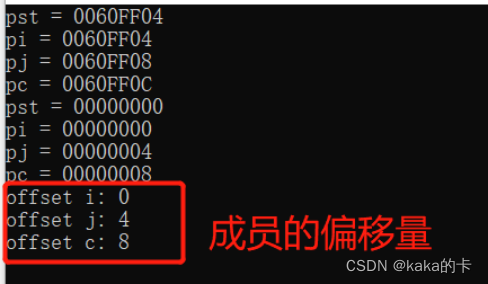
container_of
({})
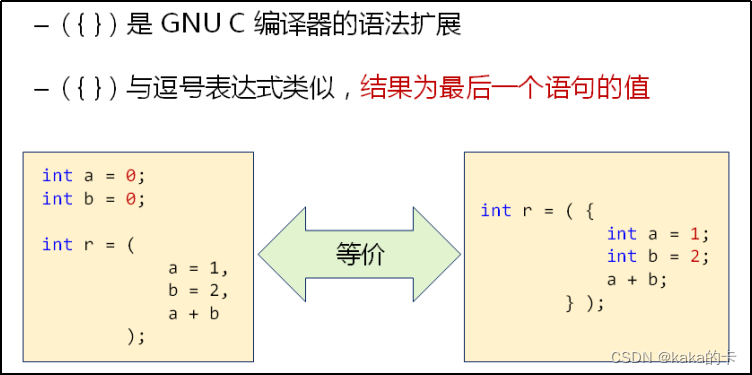
Typeof
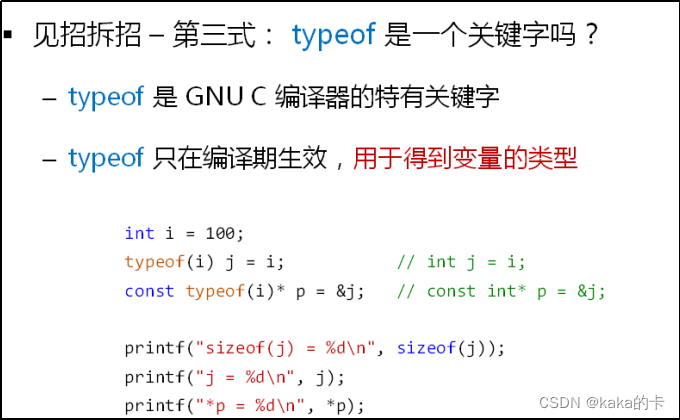
推算结构体起始地址
1.typeof(((type*)0)->member)*得到成员数据类型的指针,ptr为指向结构体成员的指针。这样写可进行类型检查。
2.((char*)__mptr - offsetof(type, member));结构体成员的地址-成员的偏移量来算出结构体的起始地址。
//推算结构体起始地址#ifndef container_of#define container_of(ptr, type, member) ({ \ const typeof(((type*)0)->member)* __mptr = (ptr); \ (type*)((char*)__mptr - offsetof(type, member)); })#endif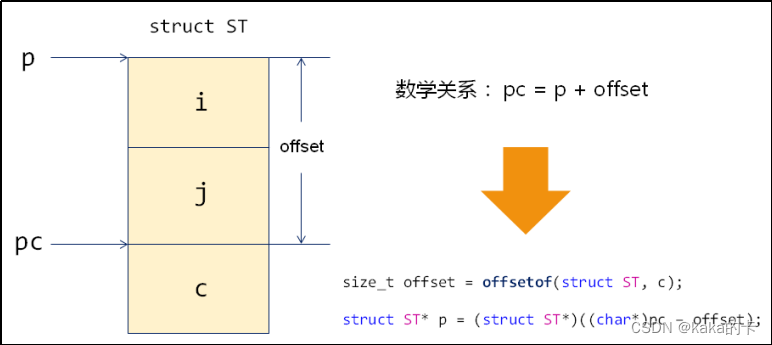
测试demo
#include <stdio.h>//offsetof用于计算TYPE结构体中MEMBER成员的偏移位置#ifndef offsetof#define offsetof(TYPE, MEMBER) ((size_t)&((TYPE*)0)->MEMBER)#endif//推算结构体起始地址#ifndef container_of#define container_of(ptr, type, member) ({ \ const typeof(((type*)0)->member)* __mptr = (ptr); \ (type*)((char*)__mptr - offsetof(type, member)); })#endif//修改后的container_of#ifndef container_of_new#define container_of_new(ptr, type, member) ((type*)((char*)(ptr) - offsetof(type, member)))#endifstruct ST{ int i; // 0 int j; // 4 char c; // 8};int main(){ struct ST s = {0}; char* pc = &s.c; struct ST* pst = container_of(pc, struct ST, c); printf("&s = %p\n", &s); printf("pst = %p\n", pst); return 0;} 
2. Linux内核链表剖析
移植linux内核链表,使其适用于非GNU编译器
Linux内核链表的位置和依赖
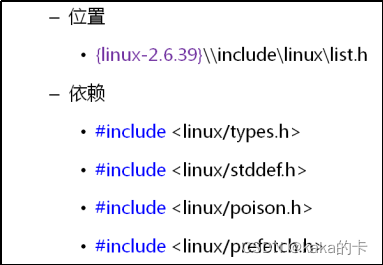
移植时的注意事项
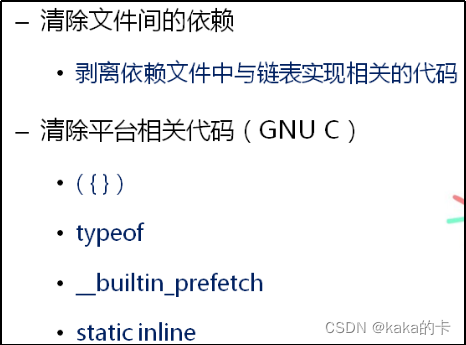
移植好的LinuxList.h
#ifndef _LINUX_LIST_H#define _LINUX_LIST_H// #include <linux/types.h>// #include <linux/stddef.h>// #include <linux/poison.h>// #include <linux/prefetch.h>#ifndef offsetof#define offsetof(TYPE, MEMBER) ((size_t) &((TYPE *)0)->MEMBER)#endif#ifndef container_of#define container_of(ptr, type, member) ((type *)((char *)ptr - offsetof(type,member)))#endif#define prefetch(x) ((void)x)#define LIST_POISON1 (NULL)#define LIST_POISON2 (NULL)struct list_head { struct list_head *next, *prev;};struct hlist_head { struct hlist_node *first;};struct hlist_node { struct hlist_node *next, **pprev;};/* * Simple doubly linked list implementation. * * Some of the internal functions ("__xxx") are useful when * manipulating whole lists rather than single entries, as * sometimes we already know the next/prev entries and we can * generate better code by using them directly rather than * using the generic single-entry routines. */#define LIST_HEAD_INIT(name) { &(name), &(name) }#define LIST_HEAD(name) \ struct list_head name = LIST_HEAD_INIT(name)static void INIT_LIST_HEAD(struct list_head *list){ list->next = list; list->prev = list;}/* * Insert a new entry between two known consecutive entries. * * This is only for internal list manipulation where we know * the prev/next entries already! */#ifndef CONFIG_DEBUG_LISTstatic void __list_add(struct list_head *new, struct list_head *prev, struct list_head *next){ next->prev = new; new->next = next; new->prev = prev; prev->next = new;}#elseextern void __list_add(struct list_head *new, struct list_head *prev, struct list_head *next);#endif/** * list_add - add a new entry * @new: new entry to be added * @head: list head to add it after * * Insert a new entry after the specified head. * This is good for implementing stacks. */static void list_add(struct list_head *new, struct list_head *head){ __list_add(new, head, head->next);}/** * list_add_tail - add a new entry * @new: new entry to be added * @head: list head to add it before * * Insert a new entry before the specified head. * This is useful for implementing queues. */static void list_add_tail(struct list_head *new, struct list_head *head){ __list_add(new, head->prev, head);}/* * Delete a list entry by making the prev/next entries * point to each other. * * This is only for internal list manipulation where we know * the prev/next entries already! */static void __list_del(struct list_head * prev, struct list_head * next){ next->prev = prev; prev->next = next;}/** * list_del - deletes entry from list. * @entry: the element to delete from the list. * Note: list_empty() on entry does not return true after this, the entry is * in an undefined state. */#ifndef CONFIG_DEBUG_LISTstatic void __list_del_entry(struct list_head *entry){ __list_del(entry->prev, entry->next);}static void list_del(struct list_head *entry){ __list_del(entry->prev, entry->next); entry->next = LIST_POISON1; entry->prev = LIST_POISON2;}#elseextern void __list_del_entry(struct list_head *entry);extern void list_del(struct list_head *entry);#endif/** * list_replace - replace old entry by new one * @old : the element to be replaced * @new : the new element to insert * * If @old was empty, it will be overwritten. */static void list_replace(struct list_head *old, struct list_head *new){ new->next = old->next; new->next->prev = new; new->prev = old->prev; new->prev->next = new;}static void list_replace_init(struct list_head *old, struct list_head *new){ list_replace(old, new); INIT_LIST_HEAD(old);}/** * list_del_init - deletes entry from list and reinitialize it. * @entry: the element to delete from the list. */static void list_del_init(struct list_head *entry){ __list_del_entry(entry); INIT_LIST_HEAD(entry);}/** * list_move - delete from one list and add as another's head * @list: the entry to move * @head: the head that will precede our entry */static void list_move(struct list_head *list, struct list_head *head){ __list_del_entry(list); list_add(list, head);}/** * list_move_tail - delete from one list and add as another's tail * @list: the entry to move * @head: the head that will follow our entry */static void list_move_tail(struct list_head *list, struct list_head *head){ __list_del_entry(list); list_add_tail(list, head);}/** * list_is_last - tests whether @list is the last entry in list @head * @list: the entry to test * @head: the head of the list */static int list_is_last(const struct list_head *list, const struct list_head *head){ return list->next == head;}/** * list_empty - tests whether a list is empty * @head: the list to test. */static int list_empty(const struct list_head *head){ return head->next == head;}/** * list_empty_careful - tests whether a list is empty and not being modified * @head: the list to test * * Description: * tests whether a list is empty _and_ checks that no other CPU might be * in the process of modifying either member (next or prev) * * NOTE: using list_empty_careful() without synchronization * can only be safe if the only activity that can happen * to the list entry is list_del_init(). Eg. it cannot be used * if another CPU could re-list_add() it. */static int list_empty_careful(const struct list_head *head){ struct list_head *next = head->next; return (next == head) && (next == head->prev);}/** * list_rotate_left - rotate the list to the left * @head: the head of the list */static void list_rotate_left(struct list_head *head){ struct list_head *first; if (!list_empty(head)) { first = head->next; list_move_tail(first, head); }}/** * list_is_singular - tests whether a list has just one entry. * @head: the list to test. */static int list_is_singular(const struct list_head *head){ return !list_empty(head) && (head->next == head->prev);}static void __list_cut_position(struct list_head *list, struct list_head *head, struct list_head *entry){ struct list_head *new_first = entry->next; list->next = head->next; list->next->prev = list; list->prev = entry; entry->next = list; head->next = new_first; new_first->prev = head;}/** * list_cut_position - cut a list into two * @list: a new list to add all removed entries * @head: a list with entries * @entry: an entry within head, could be the head itself *and if so we won't cut the list * * This helper moves the initial part of @head, up to and * including @entry, from @head to @list. You should * pass on @entry an element you know is on @head. @list * should be an empty list or a list you do not care about * losing its data. * */static void list_cut_position(struct list_head *list, struct list_head *head, struct list_head *entry){ if (list_empty(head)) return; if (list_is_singular(head) && (head->next != entry && head != entry)) return; if (entry == head) INIT_LIST_HEAD(list); else __list_cut_position(list, head, entry);}static void __list_splice(const struct list_head *list, struct list_head *prev, struct list_head *next){ struct list_head *first = list->next; struct list_head *last = list->prev; first->prev = prev; prev->next = first; last->next = next; next->prev = last;}/** * list_splice - join two lists, this is designed for stacks * @list: the new list to add. * @head: the place to add it in the first list. */static void list_splice(const struct list_head *list, struct list_head *head){ if (!list_empty(list)) __list_splice(list, head, head->next);}/** * list_splice_tail - join two lists, each list being a queue * @list: the new list to add. * @head: the place to add it in the first list. */static void list_splice_tail(struct list_head *list, struct list_head *head){ if (!list_empty(list)) __list_splice(list, head->prev, head);}/** * list_splice_init - join two lists and reinitialise the emptied list. * @list: the new list to add. * @head: the place to add it in the first list. * * The list at @list is reinitialised */static void list_splice_init(struct list_head *list, struct list_head *head){ if (!list_empty(list)) { __list_splice(list, head, head->next); INIT_LIST_HEAD(list); }}/** * list_splice_tail_init - join two lists and reinitialise the emptied list * @list: the new list to add. * @head: the place to add it in the first list. * * Each of the lists is a queue. * The list at @list is reinitialised */static void list_splice_tail_init(struct list_head *list, struct list_head *head){ if (!list_empty(list)) { __list_splice(list, head->prev, head); INIT_LIST_HEAD(list); }}/** * list_entry - get the struct for this entry * @ptr:the &struct list_head pointer. * @type:the type of the struct this is embedded in. * @member:the name of the list_struct within the struct. */#define list_entry(ptr, type, member) \ container_of(ptr, type, member)/** * list_first_entry - get the first element from a list * @ptr:the list head to take the element from. * @type:the type of the struct this is embedded in. * @member:the name of the list_struct within the struct. * * Note, that list is expected to be not empty. */#define list_first_entry(ptr, type, member) \ list_entry((ptr)->next, type, member)/** * list_for_each-iterate over a list * @pos:the &struct list_head to use as a loop cursor. * @head:the head for your list. */#define list_for_each(pos, head) \ for (pos = (head)->next; prefetch(pos->next), pos != (head); \ pos = pos->next)/** * __list_for_each-iterate over a list * @pos:the &struct list_head to use as a loop cursor. * @head:the head for your list. * * This variant differs from list_for_each() in that it's the * simplest possible list iteration code, no prefetching is done. * Use this for code that knows the list to be very short (empty * or 1 entry) most of the time. */#define __list_for_each(pos, head) \ for (pos = (head)->next; pos != (head); pos = pos->next)/** * list_for_each_prev-iterate over a list backwards * @pos:the &struct list_head to use as a loop cursor. * @head:the head for your list. */#define list_for_each_prev(pos, head) \ for (pos = (head)->prev; prefetch(pos->prev), pos != (head); \ pos = pos->prev)/** * list_for_each_safe - iterate over a list safe against removal of list entry * @pos:the &struct list_head to use as a loop cursor. * @n:another &struct list_head to use as temporary storage * @head:the head for your list. */#define list_for_each_safe(pos, n, head) \ for (pos = (head)->next, n = pos->next; pos != (head); \ pos = n, n = pos->next)/** * list_for_each_prev_safe - iterate over a list backwards safe against removal of list entry * @pos:the &struct list_head to use as a loop cursor. * @n:another &struct list_head to use as temporary storage * @head:the head for your list. */#define list_for_each_prev_safe(pos, n, head) \ for (pos = (head)->prev, n = pos->prev; \ prefetch(pos->prev), pos != (head); \ pos = n, n = pos->prev)/** * list_for_each_entry-iterate over list of given type * @pos:the type * to use as a loop cursor. * @head:the head for your list. * @member:the name of the list_struct within the struct. */#define list_for_each_entry(pos, head, member)\ for (pos = list_entry((head)->next, typeof(*pos), member);\ prefetch(pos->member.next), &pos->member != (head); \ pos = list_entry(pos->member.next, typeof(*pos), member))/** * list_for_each_entry_reverse - iterate backwards over list of given type. * @pos:the type * to use as a loop cursor. * @head:the head for your list. * @member:the name of the list_struct within the struct. */#define list_for_each_entry_reverse(pos, head, member)\ for (pos = list_entry((head)->prev, typeof(*pos), member);\ prefetch(pos->member.prev), &pos->member != (head); \ pos = list_entry(pos->member.prev, typeof(*pos), member))/** * list_prepare_entry - prepare a pos entry for use in list_for_each_entry_continue() * @pos:the type * to use as a start point * @head:the head of the list * @member:the name of the list_struct within the struct. * * Prepares a pos entry for use as a start point in list_for_each_entry_continue(). */#define list_prepare_entry(pos, head, member) \ ((pos) ? : list_entry(head, typeof(*pos), member))/** * list_for_each_entry_continue - continue iteration over list of given type * @pos:the type * to use as a loop cursor. * @head:the head for your list. * @member:the name of the list_struct within the struct. * * Continue to iterate over list of given type, continuing after * the current position. */#define list_for_each_entry_continue(pos, head, member) \ for (pos = list_entry(pos->member.next, typeof(*pos), member);\ prefetch(pos->member.next), &pos->member != (head);\ pos = list_entry(pos->member.next, typeof(*pos), member))/** * list_for_each_entry_continue_reverse - iterate backwards from the given point * @pos:the type * to use as a loop cursor. * @head:the head for your list. * @member:the name of the list_struct within the struct. * * Start to iterate over list of given type backwards, continuing after * the current position. */#define list_for_each_entry_continue_reverse(pos, head, member)\ for (pos = list_entry(pos->member.prev, typeof(*pos), member);\ prefetch(pos->member.prev), &pos->member != (head);\ pos = list_entry(pos->member.prev, typeof(*pos), member))/** * list_for_each_entry_from - iterate over list of given type from the current point * @pos:the type * to use as a loop cursor. * @head:the head for your list. * @member:the name of the list_struct within the struct. * * Iterate over list of given type, continuing from current position. */#define list_for_each_entry_from(pos, head, member) \ for (; prefetch(pos->member.next), &pos->member != (head);\ pos = list_entry(pos->member.next, typeof(*pos), member))/** * list_for_each_entry_safe - iterate over list of given type safe against removal of list entry * @pos:the type * to use as a loop cursor. * @n:another type * to use as temporary storage * @head:the head for your list. * @member:the name of the list_struct within the struct. */#define list_for_each_entry_safe(pos, n, head, member)\ for (pos = list_entry((head)->next, typeof(*pos), member),\ n = list_entry(pos->member.next, typeof(*pos), member);\ &pos->member != (head); \ pos = n, n = list_entry(n->member.next, typeof(*n), member))/** * list_for_each_entry_safe_continue - continue list iteration safe against removal * @pos:the type * to use as a loop cursor. * @n:another type * to use as temporary storage * @head:the head for your list. * @member:the name of the list_struct within the struct. * * Iterate over list of given type, continuing after current point, * safe against removal of list entry. */#define list_for_each_entry_safe_continue(pos, n, head, member) \ for (pos = list_entry(pos->member.next, typeof(*pos), member), \ n = list_entry(pos->member.next, typeof(*pos), member);\ &pos->member != (head);\ pos = n, n = list_entry(n->member.next, typeof(*n), member))/** * list_for_each_entry_safe_from - iterate over list from current point safe against removal * @pos:the type * to use as a loop cursor. * @n:another type * to use as temporary storage * @head:the head for your list. * @member:the name of the list_struct within the struct. * * Iterate over list of given type from current point, safe against * removal of list entry. */#define list_for_each_entry_safe_from(pos, n, head, member) \ for (n = list_entry(pos->member.next, typeof(*pos), member);\ &pos->member != (head);\ pos = n, n = list_entry(n->member.next, typeof(*n), member))/** * list_for_each_entry_safe_reverse - iterate backwards over list safe against removal * @pos:the type * to use as a loop cursor. * @n:another type * to use as temporary storage * @head:the head for your list. * @member:the name of the list_struct within the struct. * * Iterate backwards over list of given type, safe against removal * of list entry. */#define list_for_each_entry_safe_reverse(pos, n, head, member)\ for (pos = list_entry((head)->prev, typeof(*pos), member),\ n = list_entry(pos->member.prev, typeof(*pos), member);\ &pos->member != (head); \ pos = n, n = list_entry(n->member.prev, typeof(*n), member))/** * list_safe_reset_next - reset a stale list_for_each_entry_safe loop * @pos:the loop cursor used in the list_for_each_entry_safe loop * @n:temporary storage used in list_for_each_entry_safe * @member:the name of the list_struct within the struct. * * list_safe_reset_next is not safe to use in general if the list may be * modified concurrently (eg. the lock is dropped in the loop body). An * exception to this is if the cursor element (pos) is pinned in the list, * and list_safe_reset_next is called after re-taking the lock and before * completing the current iteration of the loop body. */#define list_safe_reset_next(pos, n, member)\ n = list_entry(pos->member.next, typeof(*pos), member)/* * Double linked lists with a single pointer list head. * Mostly useful for hash tables where the two pointer list head is * too wasteful. * You lose the ability to access the tail in O(1). */#define HLIST_HEAD_INIT { .first = NULL }#define HLIST_HEAD(name) struct hlist_head name = { .first = NULL }#define INIT_HLIST_HEAD(ptr) ((ptr)->first = NULL)static void INIT_HLIST_NODE(struct hlist_node *h){ h->next = NULL; h->pprev = NULL;}static int hlist_unhashed(const struct hlist_node *h){ return !h->pprev;}static int hlist_empty(const struct hlist_head *h){ return !h->first;}static void __hlist_del(struct hlist_node *n){ struct hlist_node *next = n->next; struct hlist_node **pprev = n->pprev; *pprev = next; if (next) next->pprev = pprev;}static void hlist_del(struct hlist_node *n){ __hlist_del(n); n->next = LIST_POISON1; n->pprev = LIST_POISON2;}static void hlist_del_init(struct hlist_node *n){ if (!hlist_unhashed(n)) { __hlist_del(n); INIT_HLIST_NODE(n); }}static void hlist_add_head(struct hlist_node *n, struct hlist_head *h){ struct hlist_node *first = h->first; n->next = first; if (first) first->pprev = &n->next; h->first = n; n->pprev = &h->first;}/* next must be != NULL */static void hlist_add_before(struct hlist_node *n, struct hlist_node *next){ n->pprev = next->pprev; n->next = next; next->pprev = &n->next; *(n->pprev) = n;}static void hlist_add_after(struct hlist_node *n, struct hlist_node *next){ next->next = n->next; n->next = next; next->pprev = &n->next; if(next->next) next->next->pprev = &next->next;}/* after that we'll appear to be on some hlist and hlist_del will work */static void hlist_add_fake(struct hlist_node *n){ n->pprev = &n->next;}/* * Move a list from one list head to another. Fixup the pprev * reference of the first entry if it exists. */static void hlist_move_list(struct hlist_head *old, struct hlist_head *new){ new->first = old->first; if (new->first) new->first->pprev = &new->first; old->first = NULL;}#define hlist_entry(ptr, type, member) container_of(ptr,type,member)#define hlist_for_each(pos, head) \ for (pos = (head)->first; pos && ({ prefetch(pos->next); 1; }); \ pos = pos->next)#define hlist_for_each_safe(pos, n, head) \ for (pos = (head)->first; pos && ({ n = pos->next; 1; }); \ pos = n)/** * hlist_for_each_entry- iterate over list of given type * @tpos:the type * to use as a loop cursor. * @pos:the &struct hlist_node to use as a loop cursor. * @head:the head for your list. * @member:the name of the hlist_node within the struct. */#define hlist_for_each_entry(tpos, pos, head, member) \ for (pos = (head)->first; \ pos && ({ prefetch(pos->next); 1;}) && \ ({ tpos = hlist_entry(pos, typeof(*tpos), member); 1;}); \ pos = pos->next)/** * hlist_for_each_entry_continue - iterate over a hlist continuing after current point * @tpos:the type * to use as a loop cursor. * @pos:the &struct hlist_node to use as a loop cursor. * @member:the name of the hlist_node within the struct. */#define hlist_for_each_entry_continue(tpos, pos, member) \ for (pos = (pos)->next; \ pos && ({ prefetch(pos->next); 1;}) && \ ({ tpos = hlist_entry(pos, typeof(*tpos), member); 1;}); \ pos = pos->next)/** * hlist_for_each_entry_from - iterate over a hlist continuing from current point * @tpos:the type * to use as a loop cursor. * @pos:the &struct hlist_node to use as a loop cursor. * @member:the name of the hlist_node within the struct. */#define hlist_for_each_entry_from(tpos, pos, member) \ for (; pos && ({ prefetch(pos->next); 1;}) && \ ({ tpos = hlist_entry(pos, typeof(*tpos), member); 1;}); \ pos = pos->next)/** * hlist_for_each_entry_safe - iterate over list of given type safe against removal of list entry * @tpos:the type * to use as a loop cursor. * @pos:the &struct hlist_node to use as a loop cursor. * @n:another &struct hlist_node to use as temporary storage * @head:the head for your list. * @member:the name of the hlist_node within the struct. */#define hlist_for_each_entry_safe(tpos, pos, n, head, member) \ for (pos = (head)->first; \ pos && ({ n = pos->next; 1; }) && \ ({ tpos = hlist_entry(pos, typeof(*tpos), member); 1;}); \ pos = n)#endif分析linux内核中链表的基本实现
linux内核链表的实现
带头结点的双向循环链表,且头结点为表中成员。头结点的next指针指向首结点。头结点的prev指针指向尾节点
linux内核链表的结点定义
struct list_head { struct list_head *next, *prev;};使用list_head自定义链表结点来存放数据
struct Node{ struct list_head head; int value;};测试demo
Main.c
#include <stdio.h>#include "LinuxList.h"void list_demo(){ struct Node { struct list_head head; int value; }; struct Node l = {0}; struct list_head* list = &l.head; struct list_head* slider = NULL; int i = 0; INIT_LIST_HEAD(list); printf("Insert begin ...\n"); for(i=0; i<5; i++) { struct Node* n = (struct Node*)malloc(sizeof(struct Node)); n->value = i; list_add(&n->head, list); } list_for_each(slider, list) { //list_entry -> container_of printf("%d\n", list_entry(slider, struct Node, head)->value); } printf("Insert end ...\n"); printf("Delete begin ...\n"); list_for_each(slider, list) { struct Node* n = list_entry(slider, struct Node, head); if( n->value == 3 ) { list_del(slider); free(n); break; } } list_for_each(slider, list) { printf("%d\n", list_entry(slider, struct Node, head)->value); } printf("Delete end ...\n");}int main(){ list_demo(); return 0;}